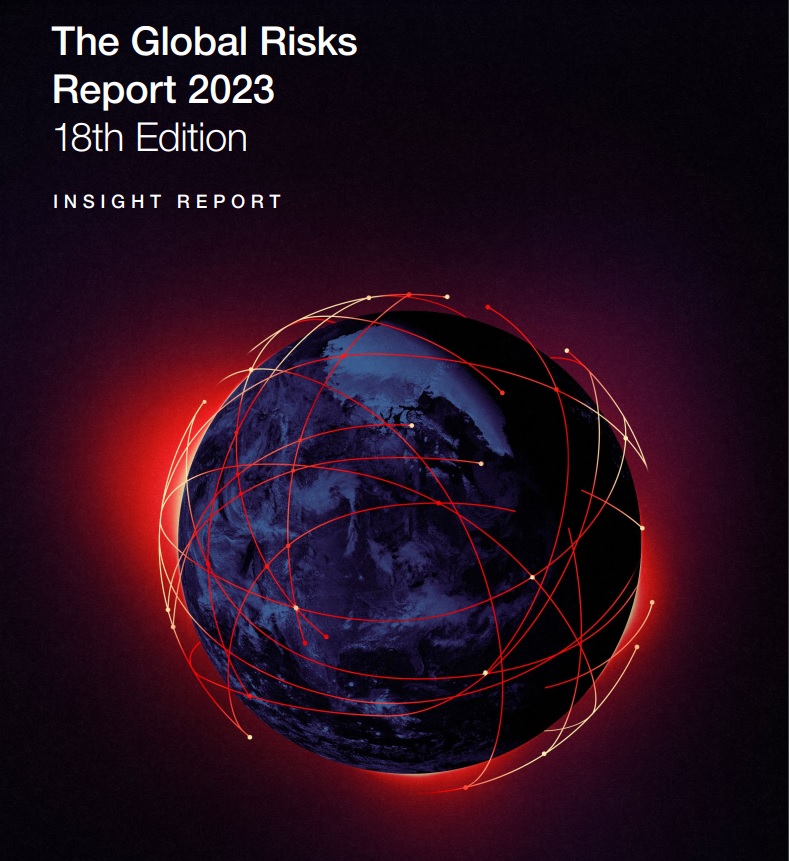Tensions Peak between Urgent Cost of Living Crisis and Sustainable Climate Action
Conflict and geo-economic tensions have triggered a series of deeply interconnected global risks, according to the World Economic Forum’s Global Risks Report 2023. These include energy and food supply crunches, which are likely to persist for the next two years, and strong increases in the cost of living and debt servicing. At the same time, these crises risk undermining efforts to tackle longer-term risks, notably those related to climate change, biodiversity and investment in human capital.
At present, the global pandemic and war in Europe have brought energy, inflation, food and security crises back to the fore. These create follow-on risks that will dominate the next two years: the risk of recession; growing debt distress; a continued cost of living crisis; polarized societies enabled by disinformation and misinformation; a hiatus on rapid climate action; and zero-sum geo-economic warfare.
The report calls on leaders to act collectively and decisively, balancing short- and long-term views. In addition to urgent and coordinated climate action, the report recommends joint efforts between countries as well as public-private cooperation to strengthen financial stability, technology governance, economic development and investment in research, science, education and health.
Drawing on insights from more than 1,200 experts and policymakers worldwide, the Global Risks Report 2023 unpacks some of the key dangers in the short term, highlights escalating risks over the next decade, and examines how competition for critical resources such as food and minerals may play out in alternate futures.
Key takeaways from the 2023 Global Risks Report:
Global Economic And Commercial Pressures
Businesses will face a turbulent year, marked by continued inflationary pressures, supply chain disruptions, and rising geoeconomic tensions. Oliver Wyman’s Dr. Lutz Jaede explores how businesses can thrive and remain resilient against these risks in 2023.
Digital, Tech, And Cyber
Risks from cybersecurity will remain a constant concern for businesses and governments.
Climate And Biodiversity
Climate mitigation and climate adaptation efforts are set up for a risky trade-off, while nature collapses.
Health And Well-Being
More frequent infectious disease outbreaks against the background of chronic diseases risks pushing exhausted healthcare systems to the brink.
At present, the global pandemic and war in Europe have brought energy, inflation, food and security crises back to the fore. These create follow-on risks that will dominate the next two years: the risk of recession; growing debt distress; a continued cost of living crisis; polarized societies enabled by disinformation and misinformation; a hiatus on rapid climate action; and zero-sum geo-economic warfare.
Unless the world starts to cooperate more effectively on climate mitigation and climate adaptation, over the next 10 years this will lead to continued global warming and ecological breakdown. Failure to mitigate and adapt to climate change, natural disasters, biodiversity loss and environmental degradation represent five of the top 10 risks – with biodiversity loss seen as one of the most rapidly deteriorating global risks over the next decade. In parallel, crises-driven leadership and geopolitical rivalries risk creating societal distress at an unprecedented level, as investments in health, education and economic development disappear, further eroding social cohesion. Finally, rising rivalries risk not only growing geo-economic weaponization but also remilitarization, especially through new technologies and rogue actors.

The coming years will present tough trade-offs for governments facing competing concerns for society, the environment and security. Already, short-term geo-economic risks are putting net-zero commitments to the test and have exposed a gap between what is scientifically necessary and politically palatable. Dramatically accelerated collective action on the climate crisis is needed to limit the consequences of a warming world. Meanwhile, security considerations and increasing military expenditure may leave less fiscal headroom to cushion the impacts of an elongated cost of living crisis. Without a change in trajectory, vulnerable countries could reach a perpetual state of crisis where they are unable to invest in future growth, human development and green technologies.
The report calls on leaders to act collectively and decisively, balancing short- and long-term views. In addition to urgent and coordinated climate action, the report recommends joint efforts between countries as well as public-private cooperation to strengthen financial stability, technology governance, economic development and investment in research, science, education and health.

The report is published by the World Economic Forum in collaboration with Marsh McLennan.
